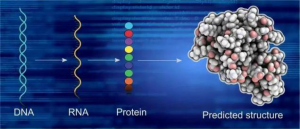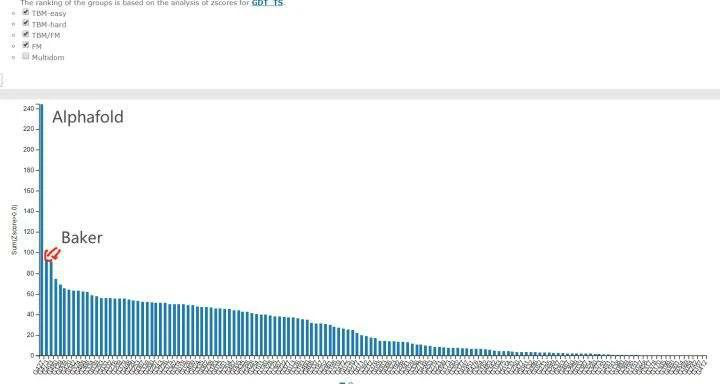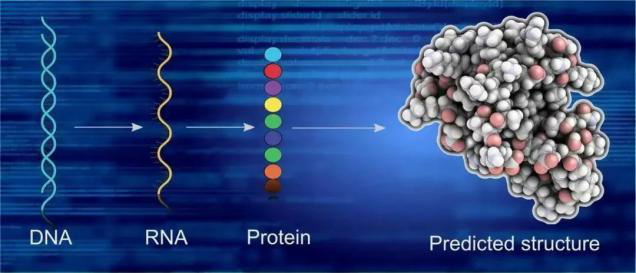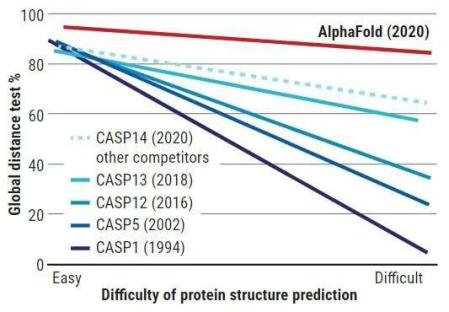
Another Nobel Prize-level problem has been overcome! This solved difficulty is the “protein folding problem” that has plagued scientists for half a century.
But the solution of this problem cannot give anyone a Nobel Prize, because this problem is cracked by the AI algorithm!

At the end of 2019, Google DeepMind launched an artificial intelligence algorithm called AlphaFold. In the International Protein Structure Prediction Competition on December 1, the AI algorithm successfully defeated all the other contestants and accurately predicted the 3D structure of the protein.
Its accuracy can be compared with cryo-electron microscope, nuclear magnetic resonance and X The 3D structure analyzed by experimental techniques such as ray crystallography is comparable.

So where is the difficulty of protein folding? Why has it troubled scientists for nearly half a century?
Proteins can assemble themselves in the cellular environment by virtue of their interactions.
This self-assembly process is called protein folding. The structure of a protein determines its function. Only studying the genome sequence does not allow us to understand the specific function of the protein, let alone know how the protein works.
The problem of protein folding is also listed as an important topic of “21st Century Biophysics”.
Since the 1960s, many scientists have devoted themselves to the problem of protein folding.
Based on the experimental results of reducing denatured bovine pancreas RNase by removing the denaturant and reducing agent, the American biochemist Anfensen proposed that the amino acid sequence of the polypeptide chain contains The self-assembly theory of all the information necessary to form its thermodynamically stable natural conformation.
with the development of understanding of protein folding problems, although this theory has been proved by many in vitro experiments, it can also be found that not all proteins conform to this theory.
Too many special environmental factors have caused protein folding in the body to be far from as simple as the theory put forward by Anfinson.

More than twenty years later, in the 1980s, Els proposed the “assisted assembly theory.” This hypothesis suggests that protein folding is not just a thermodynamic process, it is also controlled by kinetics.
But up to now, there is no experimental evidence to support this hypothesis, only part of the mathematical argument supports it. Therefore, this hypothesis can only be temporarily regarded as an incomplete understanding of the protein folding mechanism, and may even be a wrong understanding.
Perhaps the most valuable contribution that has been made in the past decades belongs to the Anfinson group’s research on the denaturation and renaturation of bovine pancreatic ribonuclease.
Bovine pancreatic ribonuclease contains 124 amino acid residues and is composed of 8 sulfhydryl groups to form 4 pairs of disulfide bonds. It can be calculated that there are 105 possible ways for the 8 sulfhydryl groups in the enzyme molecule to form 4 pairs of disulfide bonds, which provides a quantitative estimation index for refolding recombination.
This research has made a great contribution to solving the problem of protein folding, but it cannot solve this problem completely.
Today, the problems that have plagued us for nearly half a century are finally solved by AI, but can AI be done once and for all? Recently, there is another news about AI that makes people laugh and cry. Last month, the Scottish Football Champions League used AI cameras to broadcast the game.
But because one of the linesman in this game was a bald head, AI mistakenly thought that the bald referee was the ball. The camera had been following the bald referee for most of the game and did not focus on the ball at all.
This makes fans who bought online tickets to watch the live broadcast very dissatisfied.
AI technology is still under development. They can defeat humans on Go and solve problems that we cannot solve in half a century. However, they are also invented and created by humans.
If it is not human, there will be no powerful or stupid AI.
Of course AI can help us solve many problems, but AI is not omnipotent, and human subjective initiative also plays a big role in it.
Comments